President Mohamed Bazoum of Niger, deposed by a military coup d’etat last week and believed to be trapped in his presidential residence, declared himself a “hostage” and in a Washington Post column published on Thursday asked for American intervention on his behalf.
A group of soldiers identifying themselves as the “National Council for the Safeguard of the Homeland” appeared on national television in the North African country on July 27 and announced that they had ousted Bazoum, condemning him for failing to address the threats the country faces as a result of multiple jihadist terrorist organizations attempting to establish themselves there. A day later, General Abdourahmane Tchiani, the head of the presidential guard, delivered a televised speech in which he declared himself president of Niger and condemned Bazoum for squandering the “appreciable and appreciated” resources provided by international allies and asserting that the coup d’etat was necessary to prevent Niger from spiraling into criminal chaos.
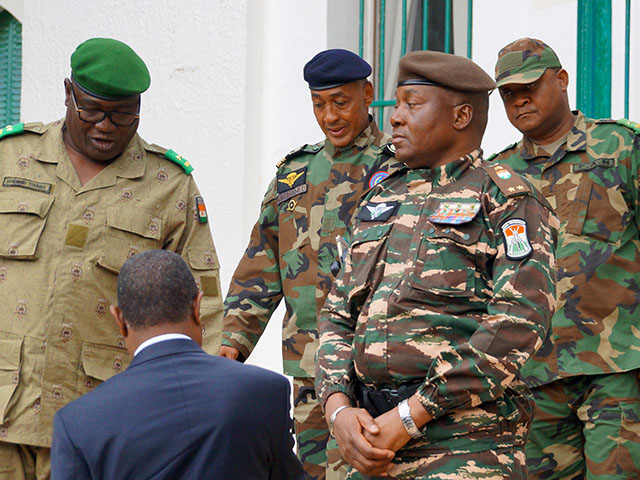
Abdourahmane Tchiani and other army commanders held a meeting in the capital, Niamey, Niger on July 28, 2023. Gen. Abdourahmane Tchiani, the head of Nigerâs presidential guard, appeared on national television on Friday and declared himself the new leader of the country after a coup (Photo by Balima Boureima/Anadolu Agency via Getty Images).
The United States, France, and other Western allies have declared they do not recognize Tchiani and continue to recognize Bazoum, who was democratically elected in 2021, as the nation’s head of state. Secretary of State Antony Blinken last spoke to Bazoum on Tuesday, asserting that America “remains committed to the restoration of the democratically-elected government, consistent with the position of the Economic Community of West African States (ECOWAS), the African Union, and international partners.”
The State Department, nonetheless, announced the partial evacuation of the embassy in Niger’s capital, Niamey, this week – the third embassy far-left President Joe Biden has lost in his tenure, following the embassies in Kabul, Afghanistan, and Khartoum, Sudan.
In his appeal to the international community, and Washington in particular, Bazoum claimed that allowing the coup to succeed in his country would destabilize the entire world and embolden Russia’s ongoing invasion of Ukraine.
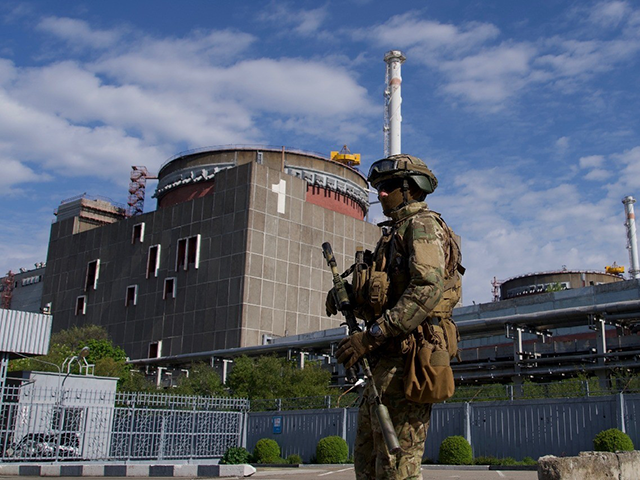
A Russian serviceman patrols the territory of the Zaporizhzhia Nuclear Power Station in Energodar on May 1, 2022. The Zaporizhzhia Nuclear Power Station in southeastern Ukraine is the largest nuclear power plant in Europe and among the 10 largest in the world (Photo by ANDREY BORODULIN/AFP via Getty Images).
“Our government came to power through a democratic election in 2021. Any attempt to overthrow a lawful government must be opposed,” Bazoum wrote in the Washington Post, “and we appreciate the strong and unequivocal condemnations of this cynical effort to undermine the remarkable progress Niger has made under democracy.”
“In Africa’s troubled Sahel region, Niger stands as the last bastion of respect for human rights amid the authoritarian movements that have overtaken some of our neighbors,” he continued. “While this coup attempt is a tragedy for Nigeriens, its success would have devastating consequences far beyond our borders.”
Bazoum claimed that Tchiani’s conspiracy could result in Russia controlling the Sahel “via the Wagner Group, whose brutal terrorism has been on full display in Ukraine.”
The Wagner Private Military Company (PMC) is a Russian mercenary organization acting with some independence from Russia. Its leader, Yevgeny Prigozhin, is a longtime ally of Russian leader Vladimir Putin, however, and was aiding the invasion of Ukraine until late June, when he abruptly announced he would invade Russia to protest the alleged mismanagement of the invasion by Russian Defense Minister Sergei Shoigu. Even as he marched his soldiers to Moscow, however, Prigozhin insisted he was not opposed to Putin or attempting to overthrow him but, rather, helping Putin more efficiently reach his goals in Ukraine.
Prigozhin ended his uprising in less than a day and agreed to limit his operations to Africa, where Wagner enjoys a significant presence in Mali, Burkina Faso, and the Central African Republic (CAR), among other countries. Audio allegedly of Prigozhin released last week indicated that he supported the Niger coup, though Tchiani and his allies have not publicly issued any statements of support for Russian or Wagner intervention.
Bazoum claimed in his column on Thursday to have made tremendous strides in the security situation in Niger, particularly in comparison to Mali and Burkina Faso, which experienced pro-Russian coups in the last two years.
“Notably, Niger’s security situation is significantly better than that of our neighbors Mali and Burkina Faso, whose governments, both installed by military takeovers, support the illegal coup,” the president wrote. “Rather than addressing security concerns by strengthening their own capacity, they employ criminal Russian mercenaries such as the Wagner Group at the expense of their people’s rights and dignity.”
“In our hour of need, I call on the U.S. government and the entire international community to help us restore our constitutional order,” Bazoum concluded. “Fighting for our shared values, including democratic pluralism and respect for the rule of law, is the only way to make sustainable progress against poverty and terrorism. The Nigerien people will never forget your support at this pivotal moment in our history.”
Niger has hosted American troops for years. The Pentagon confirmed on Tuesday that they would remain in the country for the foreseeable future, though they had paused training operations with the Nigerien military after the latter issued a statement supporting Tchiani.
“All indications right now that there’s no, you know, imminent threat against any U.S. personnel or American citizens, but again, we continue to encourage American citizens who are in the country to stay in close contact with our embassy there,” Pentagon Press Secretary Air Force Brig. Gen. Pat Ryder said on Tuesday. “As far as security cooperation, those efforts right now are suspended in light of the situation but certainly we maintain close contact with our Niger military counterparts in the country as the situation continues to unfold.”
Ryder refused to call the situation a “coup” and described it as “not normal” but emphasized the Pentagon had “no indication right now of any type of imminent threat against U.S. forces in Niger.”
The State Department nonetheless announced the next day it would be evacuating non-emergency personnel from Niamey.
“Given ongoing developments in Niger and out of an abundance of caution, the Department of State is ordering the temporary departure of non-emergency U.S. government personnel and eligible family members from the U.S. Embassy in Niamey,” State Department spokesman Matthew Miller announced.
The “National Council for the Safeguard of the Homeland” claimed in its initial coup declaration that it would respect all international alliances and agreements under Bazoum. By Friday, however, the coup plotters issued an announcement that formally ended the functions of the ambassadors of several countries to Niamey, including America. Tchiani’s group also cut ties to the ambassadors from France, the country’s former colonial ruler, and Nigeria, the leader of ECOWAS.
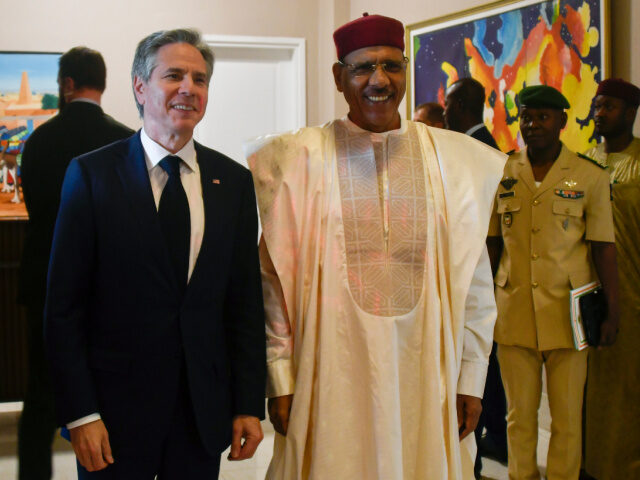
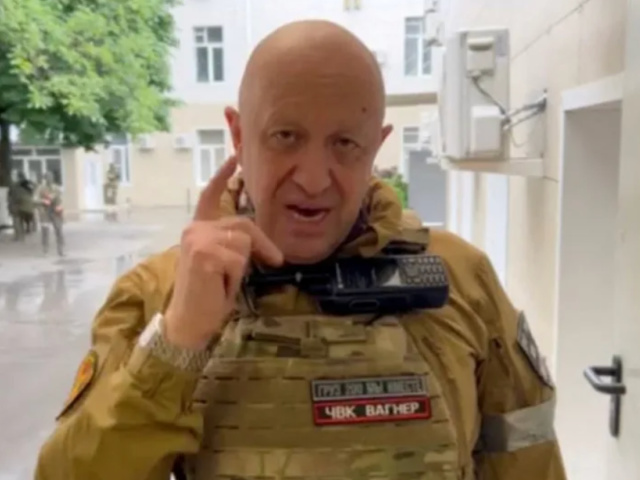
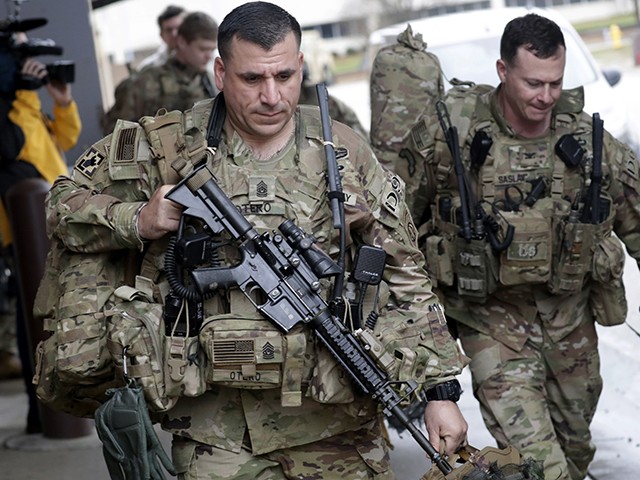
COMMENTS
Please let us know if you're having issues with commenting.